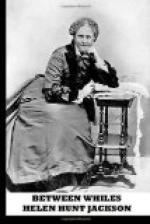Little Bel’s face flushed, and with compressed lips she turned silently to the little oaken-framed looking-glass that hung so high on the wall she could but just see her chin in it. As she slowly tied her pink bonnet strings she grew happier. In truth, she would have been a maiden hard to console if the face that looked back at her from the quaint oak leaf and acorn wreath had not comforted her inmost soul, and made her again at peace with herself. And as the mother looked on she too was comforted; and in five minutes more, when Little Bel was ready to say good-by, they flung their arms around each other, and embraced and kissed, and the daughter said, “Good-by t’ ye now, mother. Wish me well, an’ ye’ll see that I get it,—supplement an’ all,” she added slyly. And the mother said, “Good luck t’ ye, child; an’ it’s luck to them that gets ye.” That was the way quarrels always ended between Isabella McDonald and her oldest daughter.
The oldest daughter, and yet only just turned of twenty; and there were eight children younger than she, and one older. This is the way among the Scotch farming-folk in Prince Edward Island. Children come tumbling into the world like rabbits in a pen, and have to scramble for a living almost as soon and as hard as the rabbits. It is a narrow life they lead, and full of hardships and deprivations, but it has its compensations. Sturdy virtues in sturdy bodies come of it,—the sort of virtue made by the straitest Calvinism, and the sort of body made out of oatmeal and milk. One might do much worse than inherit both.
It seemed but a few years ago that John McDonald had wooed and won Isabella McIntosh,—wooed her with difficulty in the bosom of her family of six brothers and five sisters, and won her triumphantly in spite of the open and contemptuous opposition of one of the five sisters. For John himself was one of seven in his father’s home, and whoever married John must go there to live, to be only a daughter in a mother-in-law’s house, and take a daughter’s share of the brunt of everything. “And nothing to be got except a living, and it was a poor living the McDonald farm gave beside the McIntosh,” the McIntosh sisters said. And, moreover: “The saint did not live that could get on with John McDonald’s mother. That was what had made him the silent fellow he was, always being told by his mother to hold his tongue and have done speaking; and a fine pepper-pot there’d be when Isabella’s hasty tongue and temper were flung into that batch!”
There was no gainsaying all this. Nevertheless, Isabella married John, went home with him into his father’s house, put her shoulder against her spoke in the family wheel, and did her best. And when, ten years later, as reward of her affectionate trust and patience, she found herself sole mistress of the McDonald farm, she did not feel herself ill paid. The old father and mother were dead, two sisters had died and two had married, and the two sons had gone to the States to seek better fortunes than were to be made on Prince Edward Island. John, as eldest son, had, according to the custom of the island, inherited the farm; and Mrs. Isabella, confronting her three still unmarried sisters, was able at last triumphantly to refute their still resentfully remembered objections to her choice of a husband.




